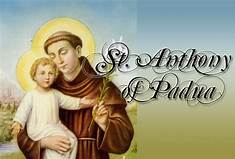The members of St. Anthony of Padua S.C.C have their meetings every Sunday after the first mass, within the church premises.

The Feast Day of St. Anthony of Padua is ~ June 13th
A native of Lisbon, Portugal, St. Anthony was baptized Ferdinand Bouillon. He joined the Canons Regular of St. Augustine in 1210. But the sight of the bodies of the first Franciscan Martyrs brought back from Morocco 10 years later inflamed him with a desire for martyrdom. His brethren therefore permitted him to join the newly founded Mendicant Order of St. Francis D’ Assisi. Having taken the name, Anthony, he was, at his own request, sent to Morocco, but falling seriously ill, he was forced to return. His ship however, was driven to Sicily by a great storm, where he heard that a general chapter had been called at Assisi for Whitsuntide 1221. He joined the 3,000 brethren there and saw St. Francis for the first time. In his humility he concealed his own learning and so was assigned menial tasks at a monastery near Forli. Only when he was urged some time later to say a few words at an ordination ceremony, was his astounding gift of preaching discovered!
Anthony could explain Holy Scripture so simply, profoundly and lucidly that St. Francis wrote to him thus: “It is my desire that you teach theology to the brethren, provided, however, that the spirit of prayer and devotion be not extinguished”. So he taught and preached throughout Southern France and Northern Italy, his winning personality, combined with a clear, powerful and pleasing voice, enabling him to impart readily his knowledge to others. God also granted him gifts of miracles , of tongues and of prophecy. Besides the prevalent heresies of the Cathari and Patarines, it was the obstinate vices of luxury, pride, tyranny, hatred and avarice which he attacked with particular zeal and success.
Humble to the core, Anthony considered his preaching and ministry, nay his whole life, as a service, thereby winning over innumerable souls for Christ; lasting reconciliation of enemies took place, common debtors were released from prison, brigands turned to an honest trade, wrongful gains were restored, and civil governments enacted beneficial laws to correct abuses.
Anthony died on 13th June 1231 aged barely 36, was canonized a year later and was declared “Doctor” in 1946 by Pope Pius XII.
He is the Patron of Portugal, of travellers, of pregnant and barren women, and of the poor (St. Anthony’s Bread). He is commonly invoked for the recovery of lost articles and by persons in danger of shipwreck.
The relic of this great saint, whose name in Greek means “priceless”, happens to be what was his most priceless asset, viz., his tongue, the organ with which he gave Padua and Lisbon the breath of God’s love. Found glowing with freshness and redness amidst the corruption of the rest of his remains, the tongue is enshrined in the Basilica built for him in 1263.
Reflection: O blessed tongue, which has always praised God and set on fire the hearts of men with His holy love! It is evident that you have gained untold merits in the Lord’s sight!”
(St. Bonaventure)
